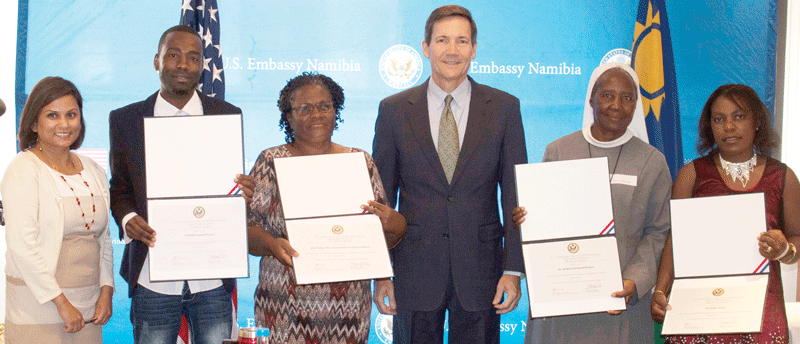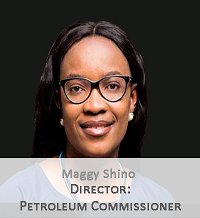
U.S Ambassador grant powers community

Penduka Women’s Solar Project, based in Windhoek’s Greenwell Matongo constituency, this week reporting back on a grant from the U.S Ambassadors self help project has managed to re-sell power back into the electricity grid.
Elisabeth Kauna Simon from the Penduka Women’s Solar Project said that the funding greatly assisted their project and its many other activities in reduce their operational cost and their monthly electricity bill which averaged at N$37 000. So much so that they women lead project is on its way too become an Independent Power Producer, Simon said.
The four recipients from the 2015 funding cycle, ETEMO Youth Project, based in the Tobias Hainyeko constituency and the Asnlem Orchard Project based in Outapi in the Omusati region. Were honoured in Windhoek this week for progress made.
Since 1990, The U.S government has awarded more than N$30 million in Self-Help grants to small development projects across Namibia.
The new grantees for the 2016 project grant cycle included a diverse range of locally generated initiatives that will improve social and economic conditions for local communities. These include a range of income-generating activities such as an irrigation project, a solar power project, a vocational youth welding and carpentry/joinery, and a computer lab for young learners.
In one case, members of a community project will use their grant to provide food and clothing for orphans and vulnerable children with a community-based gardening project.
Two projects in Windhoek will improve the livelihoods of many disabled children and adults by employing them and developing their creative talents. One project will help young learners to become literate in basic computer programs and applications.
The four 2016 Self-Help grantees will share a total of N$700,000 for community development projects in three regions. Ada Huigu Otto Zamseb Pre-Primary School, based in Rehobooth, teaches young learners to become computer literate – a vital skill as the world increasingly depends on knowledge based economies with are digitally built and connected.
“The Self-Help programme is unique because it gives us at the American Embassy an opportunity to respond directly the need for local communities at grass roots level.” Ambassador to to Namibia, Thomas F. Daughton, said at the event. Adding that the program prioritized communities to come up with their own solutions and not merely give out handouts. “Quite simply, it allows us to help Namibian implement Namibian solutions to Namibian challenges,” Daughton said.
The recipients had a seat at the table, where a round table discussion was had, focusing on the financial and progress reporting requirements of the Self-Help program in time for the recipients submission of their final reports. The Self-Help Coordinator for the project, Shivon Sutton, encouraged the grant recipients to poke and evoke critical questions in getting their business’s to the next step.
“We are hoping that this workshop will also be an opportunity for new and former grantees to share their best practices, exchange ideas, and discuss lessons learned.” Sutton said. Young Achievers Solar Jar Project, a 2015 recipient of the project mentioned how receiving the grant forced their group made up of University students to sacrifice sleep and social down time. Kauna Simon, from the solar jar project on behalf of Ahoki Kandjimi, the team leader, said that the successfully carried out the project at the Gabriel Taapopi Secondary School in the Oshana region and other two regions where they carried out training and dispersed solar jar lights to the community.
“Currently we only have Windhoek left to complete our activities in time for the closing of the project.” Simon said. Kathy Hampe, from the L.I.C.K Ice Cream Project, a 2013 grantee acknowledged how they had to pool the community resources and knowledge, particularly for bookkeeping processes and tracking the expenditure of the business.











































